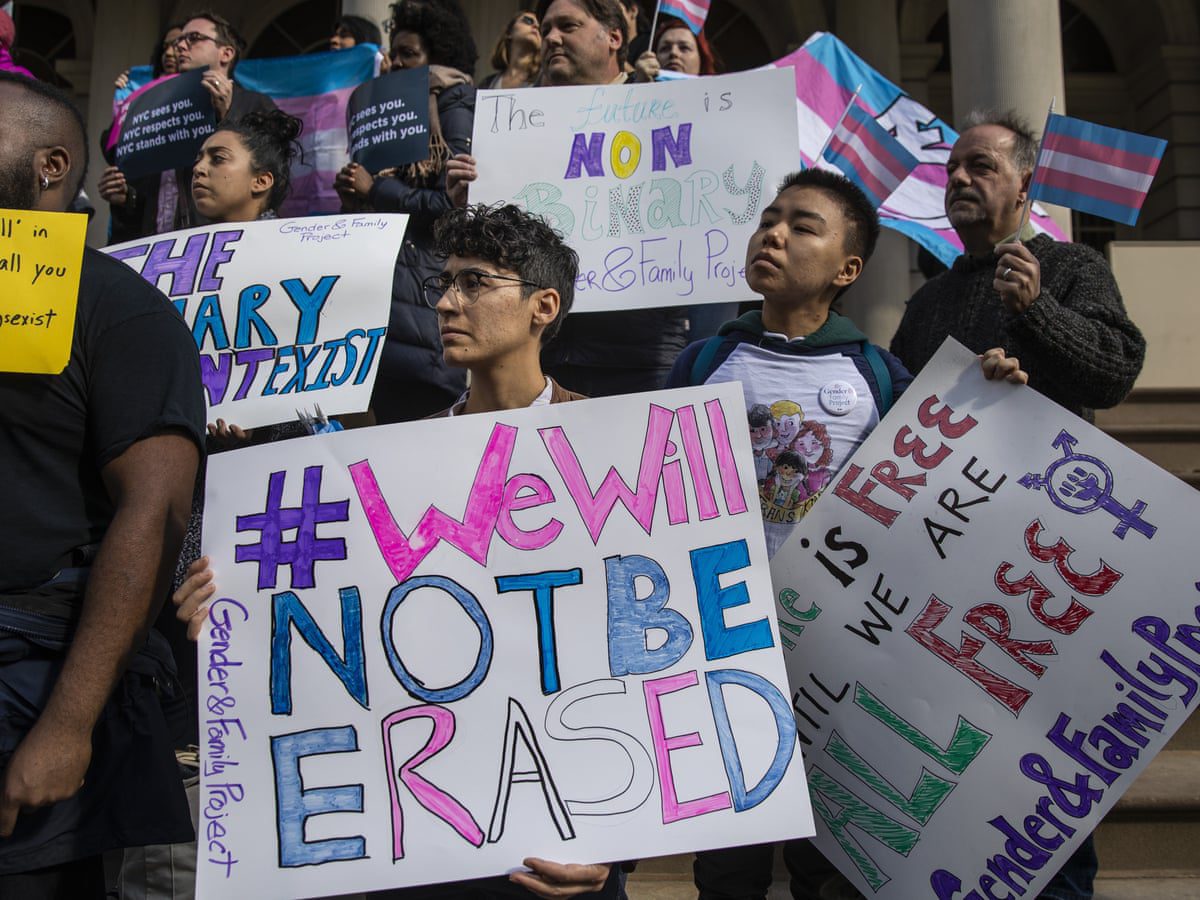Past Events
2020-2021
April 13, 2021, 11:30 am – 12:45 pm
Webinar / no registration required:
The Contemporary Anti-Trans Political Movement
Lecture & dialogue with Haley Brown
Haley Marie Brown is a transgender woman and a recent graduate of the Holocaust and Genocide Studies M.A. Program at Stockton University in New Jersey. In 2019, her pathbreaking research in examining the genocidal nature of transphobia and anti-trans violence was recognized as “offering the most important contribution to the study of gender and genocide in nearly two decades” by IAGS [the world’s leading genocide-studies association] President Henry Theriault.
The recent legislation in Arkansas and North Carolina are an existential threat to all transgender people in the United States. With a conservative supermajority on the Supreme Court, such legislation is designed with one specific intention: to get the Supreme Court to effectively legislate transgender people out of existence altogether.
Sponsored by UNC Charlotte’s Center for Holocaust, Genocide & Human Rights Studies, the Women’s & Gender Studies Program, and the university’s LGBTQ+ Caucus
April 15, 2021, 11:30 am – 1:15 pm (2021)
Kurdish Women Making Revolution in Rojava (North and East Syria)
Ruken Isik in Conversation with Sinam Sherkany Mohammad, Meghan Bodette, and Elif Genc
Webinar / no registration required:https://uncc.zoom.us/j/91015542616Isik
is a Kurdish-American researcher and a Ph.D. candidate at the University of Maryland, Baltimore County. Her work focuses on Kurdish Women’s Activism in Turkey, Syria, and in the diaspora.
Bodette received a Bachelor of Science in Foreign Service from Georgetown University, where she concentrated in international law, institutions, and ethics. She directs the Missing Afrin Women Project,
Genc is a PhD student in politics at the New School for Social Research and adjunct professor at St. John’s University and Marymount College in New York. She is also an activist in the Kurdish women’s freedom movement in Canada and the United States.
is Representative of the Syrian Democratic Council to the United States and has served as the European representative of the Democratic Self-Administration of Rojava and co-chair of Rojava’s Democratic Society Movement.
Kurds are the world’s largest nation without a state to call their own — some 35 million people spread across parts of Turkey, Iraq, Syrian and Iran, not to mention the diaspora. They have suffered severe repression and even genocide in all those countries and have been fighting for independence and liberation for generations. Kurdish military units, several of which are led by women, have also led the fight against ISIS in recent years.
Since 2012 Kurds have conducted a radical experiment in self-governance in the northern region of Syria called Rojava, which borders Turkey. They have created a decentralized economy, known as a Democratic Confederacy, based on the principles of radical democracy, social ecology, and feminism. With the complicity of the U.S. government, Turkey invaded Rojava and other parts of the region in October 2019.
For more, see a recent article by Sinam Sherkany Mohammad titled “One Year After the Turkish Invasion that Shocked the World, Turkey Still Occupies Our Land” and a September 2020 article, “Women kidnappings spike in lawless Turkey-controlled Afrin,” quoting Bodette as well as Sherkany.
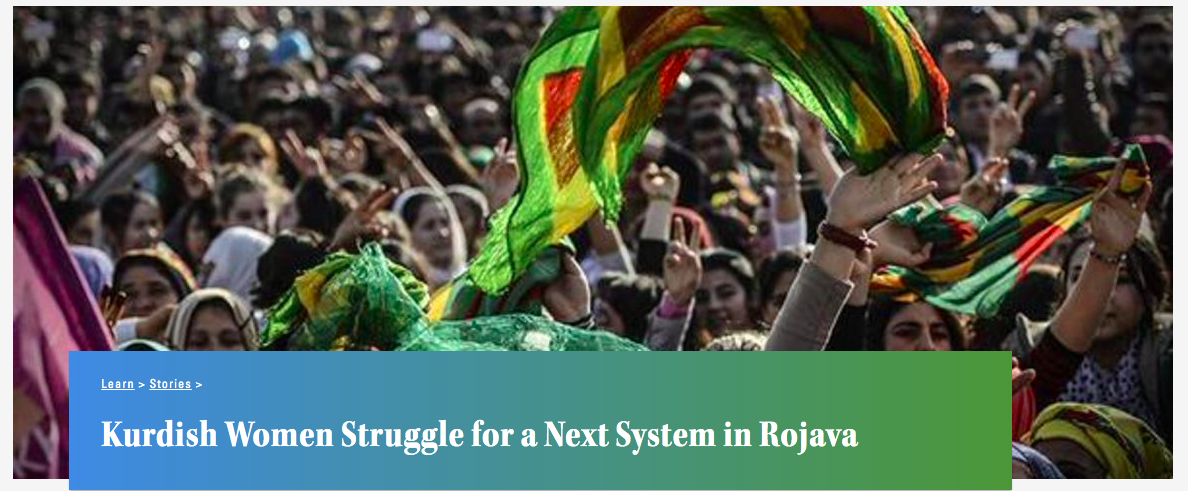
An Interview with Ruken Isik: Kurdish Women Struggle for a Next System in Rojava
Sponsored by the Department of Global Studies, its Center for HGHR Studies, and Women’s & Gender Studies. This event is made possible by a Mini-Grant from the Chancellor’s Diversity Challenge Fund. More infoirmation: Dr. Emek Ergun, eergun@uncc.edu
February 25, 2021, 11:30 am – 1:30 pm
Hamlet, NC Fire of 1991: The Real Cost of “Cheap Labor”
To register for the event (on Zoom)
Speakers include Bryant Simon, author of the award-winning 2017 book on the atrocity, and Ashaki Binta, long-time activist with Black Workers for Justice and other movements; she was active in advocating for justice for the victims and survivors in the aftermath of the tragedy.
On the morning of September 3, 1991 the Imperial Foods chicken processing plant in Hamlet, North Carolina burst into flames. But managers had locked and bolted the factory’s doors. Engulfed in choking smoke and heat, the workers could not escape. Twenty-five workers died, fifty-five were injured. Eighteen of them were women, twelve were Black. Forty-nine children lost their parents.
Typical of the industry and the region, the workers were paid just above the minimum wage. The plant had never been inspected for health and safety. The employer, Emmet Roe, was fiercely anti-union. He was eventually convicted but was released from prison after merely four years.

Eight decades after the notorious Triangle Shirtwaist Fire in New York, such industrial disasters were supposed to have been a thing of the past, and yet “the story of Hamlet … shows how cheap labor, cheap government, and cheap food came together in a way that was bound for tragedy.”
The Hamlet Fire exposed the real, human cost of the drive for cheap labor. In remembering those so sadly lost we also consider how to support Black women and other workers who continue fighting conditions of extreme exploitation.
For more background on this atrocity: 2017 article in Smithsonian Magazine
Co-sponsored by Charlotte’s Romare Bearden chapter of the Association for the Study of African American Life and History (ASALH) and by UNC Charlotte’s Department of Africana Studies, the Women’s & Gender Studies Program, and the Department of History
January 26, 2021, 7:00pm, on Zoom
Renowned Social Psychologist Prof. James Waller on “Becoming Evil: How Ordinary People Commit Genocide and Mass Murder”
With Appalachian State University’s Center for Judaic, Holocaust, and Peace Studies along with Queens University’s Greenspon Center for Peace and Social Justice, our Center for HGHR Studies invites the public to an online program with Prof. Jim Waller, the Cohen Professor of Holocaust and Genocide Studies at Keene State College (New Hampshire).
Prof. Waller will speak on “Becoming Evil: How Ordinary People Commit Genocide and Mass Murder,” also the title of one of his most influential and pathbreaking studies. The presentation will start on Tuesday, January 26, at 7:00 pm EST. Based on an evolutionary perspective, Prof. Waller offers an intriguing and disturbing psychological view of how (almost) anyone can be induced to participate in genocidal crimes.
Dr. James E. Waller is the inaugural Cohen Professor of Holocaust and Genocide Studies at Keene State College, one of the nation’s oldest Holocaust resource centers. A widely-recognized scholar in the field of Holocaust and genocide studies, Prof. Waller widely researches, teaches and consults for memorials, research centers, universities, government, and non-governmental institutions around the world.
Waller is also widely recognized for his work on intergroup relations and prejudice. He developed a study program, “Prejudice Across America,” which drew national media attention and was named by President Clinton’s Initiative on Race as one of America’s Promising Practices for Racial Reconciliation. He serves on the board of the Journal for the Study of Anti-Semitism, as an editor-in- chief for Genocide Studies and Prevention, and is an honorary member of the International Expert Team of the Institute for Research of Genocide Canada.
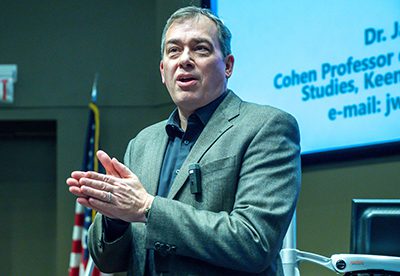
Important report written by Dr. Waller in late October 2020: “The Escalating Risk of Mass Violence in the United States“
2020 Events
Tuesday February 25, 2020
Carl Wilkens
“Why I Stayed in Rwanda”
2:30 – 3:45pm, Halton Reading Room (in Atkins Library)
“So what would you do if, like Carl Wilkens, you were caught in the middle of a genocide?” asked Nicholas Kristof in a New York Times article. “U.S. officials and church leaders ordered Mr. Wilkens to join an emergency evacuation of foreigners from Rwanda, and relatives and friends implored him to go. He refused….
“One evening the militia came to kill Mr. Wilkens and his Tutsi servants, but Hutu neighbors praised his humanitarian work and the militia went away. Death threats piled up, but Mr. Wilkens spent his days talking his way through roadblocks of snarling, drunken soldiers so he could take water and food to orphanages around town. The Raoul Wallenberg of Rwanda, he negotiated, pleaded and bullied his way through the bloodshed, saving lives everywhere he went.”
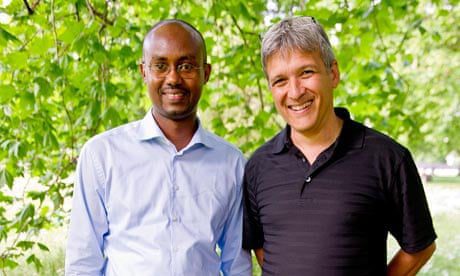
Carl Wilkens was the only American who chose to stay in Kigali, Rwanda throughout the 1994 genocide. Working with Rwandan colleagues, they helped save the lives of hundreds. His harrowing yet hopeful journey weaves together stories of tremendous risk and fierce compassion in the midst of senseless slaughter.
Photo: “Jean-Francois Gisimba and Carl Wilkens together in London (2011).” From The Guardian: “Rwanda Heroes, 17 Years On: In 1994, against huge odds, two men saved hundreds of Tutsis during the genocide in Rwanda. Finally reunited, they recall the extraordinary story of their first meeting.”)
Co-sponsored by UNC Charlotte’s Departments of Religious Studies, Africana Studies, History, and Global Studies and by UNC Charlotte’s Center for Professional and Applied Ethics
The HGHR Center is proud to co-sponsor this event
[To be re-scheduled]
Geoffrey Adelsberg
Professor of Philosophy, Edgewood College
Cone room 210, 2:30 – 3:45
His research focuses on the philosophy of race and racism and its contributions to thinking about punishment and responsibility in the aftermath of traumatic harms. In his research, he has evaluated the moral, social, legal, and political claims of persons victimized by crime and sought to construct reparative responses to those claims. His present work takes up the intersections and contentions between Black and Jewish thought on reparation for historical and present injustices.
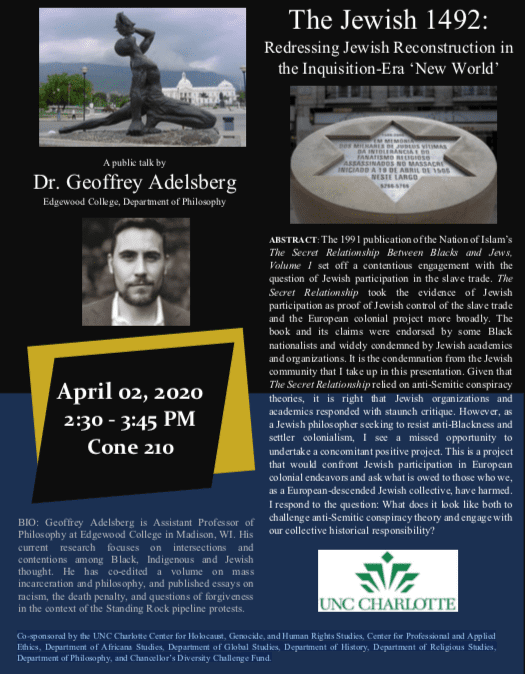
The HGHR Center is proud to co-sponsor this event:
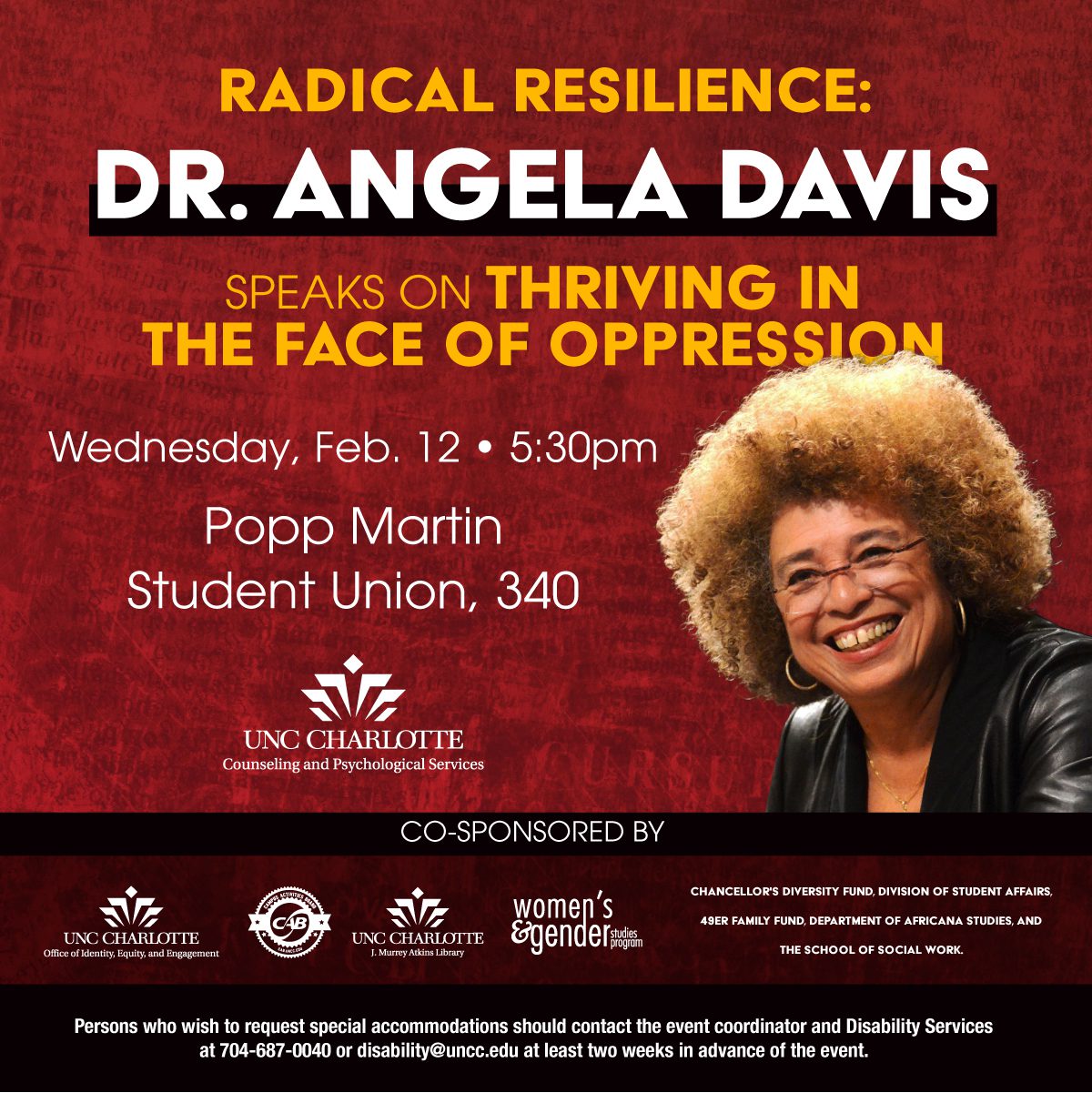
The HGHR Center is proud to co-sponsor this event, May 20-23, 2020
[To be re-scheduled]
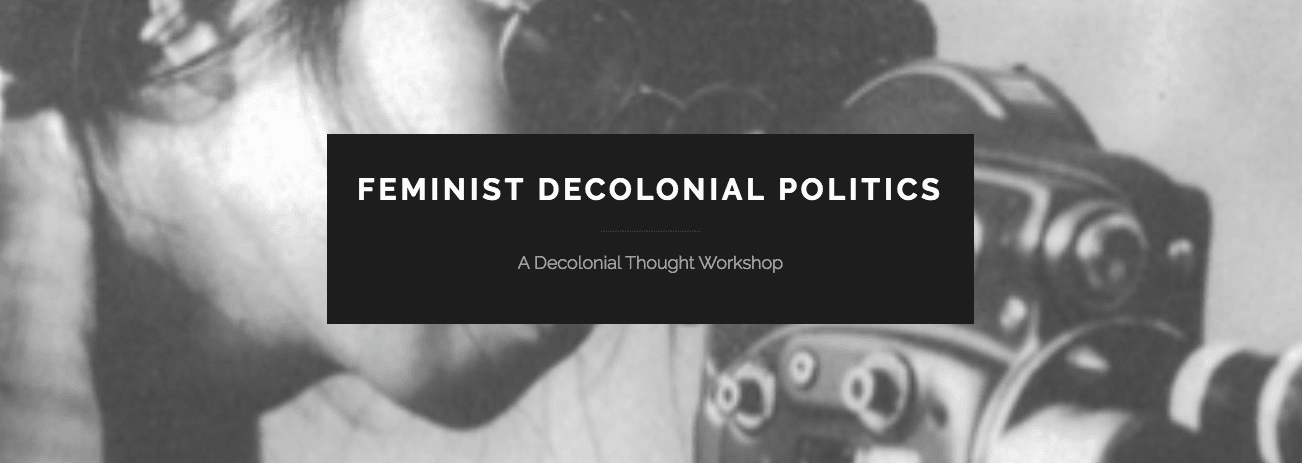
The Feminist Decolonial Politics Workshop seeks to create a space for junior scholars and graduate students to engage in rigorous discussions of seldom-read figures in feminist decolonial theory. This 4-day intensive workshop provides an opportunity to enrich participant’s research and pedagogy through sustained engagement with the work of a given author. In the past, we have read the works of Audra Simpson, Saidiya Hartman, Sara Ahmed, Trinh T. Minh-ha, and Sylvia Wynter.
Applications are due February 17th, 2020. More information
